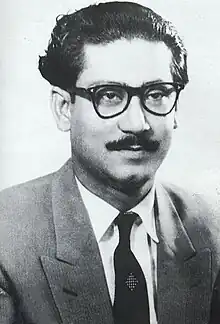| Bhat De Haramzada, Noile Manchitro Khabo | |
|---|---|
| by Rafiq Azad | |
| Original title | ভাত দে হারামজাদা, নইলে মানচিত্র খাবো |
| Country | Bangladesh |
| Language | Bengali |
| Series | Simaboddho Jole, Simito Sobuje |
| Subject(s) | Bangladesh famine of 1974 |
| Genre(s) | Poem |
| Publisher | Priyomukh |
| Publication date | 1974 |
| Lines | 33 |
Bhat De Haramzada, Noile Manchitro Khabo (lit. 'Give me food, bastard! Or I will engulf your map') is a famous Bengali-language Bangladeshi poem written by Rafiq Azad. It is included in his poetry book Simaboddho Jole, Simito Sobuje. Its subject is Bangladesh famine of 1974 that was the cause of food shortage in Bangladesh. The poet mentioned Sheikh Mujibur Rahman in the poem indirectly who is founder of Bangladesh. It has 33 rhythmic lines.
Background
In 1974, three years after Bangladesh's independence, a famine occurred due to rampant corruption that resulted in food shortages in the country at that time.[1] At that time, a journalist of Daily Ittefaq took photos of one person wearing a net and another one pretending to eat vomit and published these in the newspaper. After seeing the propaganda photos, Rafiq Azad got angry and wrote the poem.[2] The poem was published in the poetry book Simaboddho Jole, Simito Sobuje. The book was banned by the then government for the poem.[3] After writing the poem, some people became his enemies. Even though the then prime minister Sheikh Mujibur Rahman did not tell him anything, Rafiq Azad had to submit the reason for writing the poem to the Deputy inspector general of police in written form as an accountability at the Special Branch office.[2]
Themes
The main theme of the poem is the Bangladesh famine of 1974. At that time, the lack of food caused the reaction in the public mind, the poet highlighted in his poem.[1] Columnist Aktar Hosen thinks that the poet blamed Sheikh Mujibur Rahman for the famine in the poem and called him "Haramzada". For that, he criticised the poet.[4]
Analysis
As a prose poem, open syllable and blank verse forms are used here.[5]
Reception
This poem was popular with Siraj Sikder and the members of National Socialist Party. Humayun Azad called the poem Rafiq Azad's "fury expressed in slang". Imdadul Haq Milan said about the poem, "Rafiq Azad was a imperious freedom fighter. He was the assistant of Kader Siddique. He was a follower of Bangabandhu Sheikh Mujibur Rahman. He shook the country by writing the poem during the famine of the 1974..."[4]
References
- 1 2 "'ভাত দে হারামজাদা, নইলে মানচিত্র খাবো'" [Bhat De Haramzada, Noile Manchitro Khabo]. Dhakatimes24.com (in Bengali). 12 March 2016. Archived from the original on 16 September 2019. Retrieved 2 August 2022.
- 1 2 Jabbar Al Nayeem (14 March 2020). "রফিক আজাদের সাক্ষাৎকার" [Interview with Rafiq Azad]. Bangla Tribune (in Bengali). Archived from the original on 2 August 2022. Retrieved 2 August 2022.
- ↑ Chowdhury, Mayur (10 March 2017). "কালের খেয়া: কথা প্রসঙ্গে রফিক আজাদ" [Kaler Kheya: Rafiq Azad in conversation]. Samakal (in Bengali). Archived from the original on 2 August 2022. Retrieved 2 August 2022.
- 1 2 "রফিক আজাদের কবিতার 'হারামজাদা' সর্বকালের শ্রেষ্ঠ বাঙালি" [Rafiq Azad's poem 'Haramzada' and the best Bengali ever]. Channelionline.com (in Bengali). Channel i. 18 March 2016. Archived from the original on 2 August 2022. Retrieved 2 August 2022.
- ↑ "রফিক আজাদ এক বিপ্লবী কবি" [Rafiq Azad, a revolutionary poet]. Inqilab (in Bengali). 1 January 2020. Archived from the original on 5 August 2022. Retrieved 2 August 2022.
External links
- The poem on Banglarkobita.com (in Bengali)
Further reading
- Chaklader, Raju (13 April 2016). "ভাত দে হারামজাদাঃ ইতিকথার পরের কথা" [Bhat de Haramzada: The afterword of the legend]. Bdnews24.com (in Bengali). Retrieved 19 August 2022.
